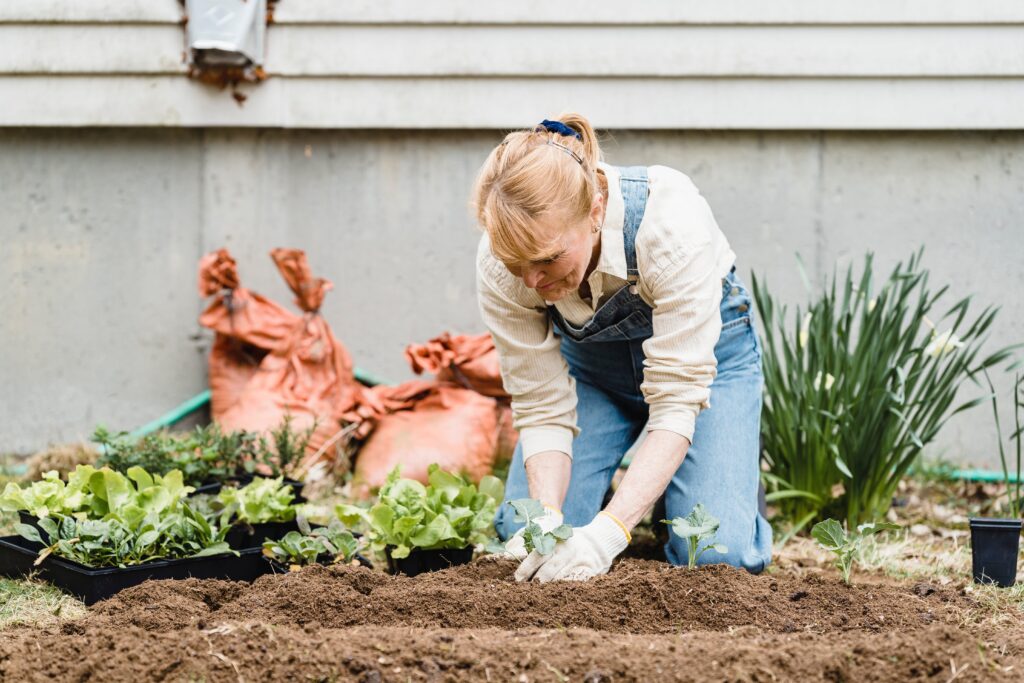Develop Healthy Hobbies as a Family
The most effective habits are often ones we start at a young age which include some level of accountability. Building healthy habits into family time checks both of those boxes. Parents and other caregivers can improve their health while also setting a positive example for children and younger relatives. Plus, working on specific, healthy activities together can push everyone to pitch in, stay committed, and improve the family’s return on their life.
Think about how incorporating one of these activities into your family’s routine could help everyone build healthier lifelong habits.
1. Sports and exercise.
You and your older kids probably have separate exercise routines or sports. But are there active activities you can still do together? Before the kids run out of the house after dinner – or on a weekend day – take a family walk or bike ride. Invite your child to tag along to your next golf or tennis lesson so they can see how working with pros can improve performance. Raise your hand the next time one of the kids’ teams needs an assistant coach. I first did this when my kids were young. Not long after, I was the head coach of many of their teams.
I continued to coach all our kids until their activities were interrupted by COVID. After that, our daughter only played club lacrosse; I’m not qualified to coach that sport at that level. Coaching allowed me to get to know many of our kids’ friends and their peers. I also got to know many of their parents better, too. Plus, it benefited my relationship with my kids. Deciding to coach was one of the best decisions I made as a parent. You might also find an activity that’s new to all of you that you can try together. It’s never too late to plan your first family camping trip or sign up for group ski lessons.
2. Family game night.
Family game night is a valuable tradition that goes beyond mere entertainment. It provides numerous benefits that can foster healthy hobbies and strengthen familial bonds. This regular gathering encourages communication, strategic thinking, and teamwork, strengthening the familial bond.
Additionally, it serves as a wholesome alternative to excessive screen time, encouraging face-to-face interaction and genuine connections. It can also help families reduce their reliance on electronic devices, contributing to a healthier family dynamic.
Establishing a sense of routine and tradition, it contributes to a stable environment that enhances emotional well-being and can create lasting memories. In essence, family game night is a simple yet effective strategy for building healthy hobbies and nurturing familial unity.
During the pandemic lockdown, we made Saturday family game night. I taught everyone how to play Texas hold‘em. If someone got knocked out, whoever had the most chips would give them some so they could keep playing. The winner was whoever won the night’s last hand. We eventually added other games to the mix. The previous week’s winner got to choose the additional game. The biggest benefit was that it helped bring our kids closer together. Their relationships today are much stronger than they were before the pandemic hit.
3. Volunteering and community outreach.
Talking to your children about the causes that are important to them, or introducing younger kids to problems that they can help solve, can be a great way to make doing good a family activity. These conversations can also open your eyes to what’s on the minds of the next generation and give you a new perspective on how you’re using your time and money to give back.
Once you’ve settled on a particular cause or organization, consider volunteer opportunities the whole family can participate in. If a weekly commitment doesn’t work with everyone’s schedule, you might circle a few big events throughout the year, like food drives or holiday toy drives. You could also talk to your kids about things you can all do to help your neighborhood. Combine a picnic in the park with a little bit of trash collecting. Or have the kids push your lawnmower next door to help an elderly neighbor.
4. Eating healthier meals.
There are some nights when your family’s busy schedule will make carry-out meals a necessity. But if fast food becomes the norm, your kids might develop some unhealthy eating habits, especially once they’re teenagers and you can’t monitor every meal they’re grabbing. It won’t be good for your waistline either.
One of the best ways to teach kids to be more mindful of what they’re eating is by having them participate in meal planning and prep. Circle a few calmer nights during the week when no one is rushing around, and your family can have dinner together. Ask the kids to find healthy recipes they would like to try. Then take a family trip to the grocery store or your local farmer’s market to get any ingredients you don’t have on hand.
If your kids aren’t old enough to handle knives safely or work on a hot stove, give them simpler tasks like washing vegetables, adding condiments and garnishes, or setting the table. Within a few weeks, older children might have a couple of meals they can prepare themselves under their belts. And your family will have a new, healthy activity to look forward to when you all have time to share a meal. When your kids get older, this type of activity will help teach them a life skill that will help them eat healthier throughout their lives, too.
Your health and your family’s health should be an important part of your Life Plan. Whether you want to set a better budget for meals and groceries or invest in better coaching for your young soccer prodigy, our tools and Life Planning process can help you live happier and healthier with the money you have.
This Week’s Favorite Reads
In this week’s favorite reads, we highlight topics that can benefit your personal and financial life. The first article shares some ways you can help your partner save more for retirement. You will also find some suggestions to help you address some real-world challenges, get fresh starts, and manage setbacks. You will also find some tips to help you understand the tax treatment when you sell your primary residence.
Here are the links to this week’s articles as well as a brief description of each and why you should check it out:
1. How to Help a Partner Save More for Retirement.
You and your partner may be a couple, but your thoughts and views about money as well as your retirement savings may not be aligned. One of you may have saved less than the other – or even not started saving at all. A simple task that often gets overlooked is making a spousal contribution to an IRA. This can be done even if your spouse doesn’t have any earned income. In addition to spousal IRA contributions, the article includes six other suggestions you can take to help a spouse or significant other bolster their retirement savings. You can also check this blog which discusses additional steps women can take to overcome a retirement shortfall.
2. Insight & Action: Fresh Starts and Setbacks.
Dr. Joy Lere is a Licensed Clinical Psychologist. I enjoy the emails I receive from her every Saturday. In this Q&A, she offers some suggestions to help us react to real-world challenges. As discussed in the opening to some recent favorite reads (here and here), we often struggle to keep our New Year’s resolutions. Our efforts often fail because of how we react in the hard moments. What do you do when you don’t “want” to make a healthy decision? Dr. Lere stresses the importance of mindset. She also provides some suggestions to help you move from “survive” to “thrive” and raise your emotional intelligence. Finally, she shares some prompts that can help you with something you want to quit, to learn, to have, to start, or to stop as well as be someone you want to be.
3. Are We Qualified?
When you sell your primary residence, you can qualify for a big tax break. Married couples can exclude up to $500,000 of gains when selling their primary residence. Singles can exclude up to $250,000 of gains. Note that if you reinvest your sales proceeds in a new home, you need not worry about this exclusion. It generally only comes into play when you downsize and/or change from owner to renter.
While this tax break is valuable, the rules around it can be both strict and confusing. That shouldn’t be that surprising. After all, many view tax rules as confusing anyway. The rules can also work against you depending on your facts and circumstances. This article discusses some of the more confusing aspects of these rules. They can help or hurt you if you have a second home that you turn into your primary home or if the property was a rental home at some point.
4. How To Ask For A Mental Health Leave Of Absence.
When we think about health, we often focus on physical health. But mental health matters, too. As cited in this article, according to the World Health Organization, on a global basis, 12 billion working days are lost annually due to depression or anxiety. The resulting loss of productivity has a significant economic impact, too. When we have surgery, we need time to recover. The same may apply to mental health issues as well. When you work for a long time while raising a family, you can encounter mental health issues. The likelihood can be even greater when life transitions such as an empty nest loom. The experts in this article offer advice on how to broach the conversation.
5. The 5 Best Platforms To Sell Your Stuff Online.
Are you looking to do some cleaning up in the new year? You can donate unwanted items and get a tax break. You can also consider turning your treasure into cash by selling your stuff online. Online sales platforms have made it easier than ever to sell things without ever leaving your home. This article offers some suggestions to make your items more attractive to potential purchasers. It also discusses some of the online sales platforms you may want to use. You can even find out what items sell the best on each platform.
Our practice continues to benefit from referrals from our clients and friends. Thank you for your trust and confidence.
If you would like to talk to us about financial topics including your investments, creating your life plan, saving for college, or saving for retirement, please complete our contact form or schedule a call or a virtual meeting via Zoom. We will be in touch.
Follow us:
Please note. We post information about articles we think can help you make better money-related decisions on LinkedIn and Facebook.
For firm disclosures, see here: https://apprisewealth.com/disclosures/




